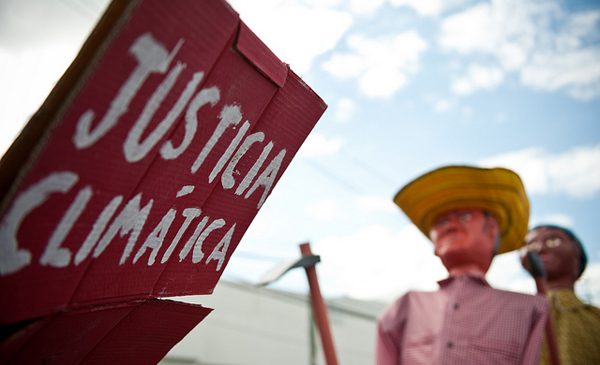
Oxfam has joined with 215 other organisations in calling for the establishment of a fair global climate fund at COP-16 that will meet the needs and interests and protect the rights of the most vulnerable communities and people around the world.
Alongside rapid and deep emission reductions, developed countries must deliver on their long-term climate finance commitments under the UNFCCC and Bali Action Plan. The establishment of a fair global climate fund at COP-16 is essential for the effective use of long-term, new and additional, predictable and public climate finance provided by developed countries.
Climate change is already negatively affecting the lives and livelihoods of people living in poverty. Poor people are losing out twice: they are hardest hit by a crisis they did not cause, and they are not yet served by funds that should be helping them. Most existing funds have benefited just a handful of developing countries, privileging mitigation over adaptation and offering little scope for the meaningful participation of affected communities, especially women.
There is an urgent need to establish a new fair global climate fund to help developing countries build resilience to the impacts of climate change, protect their forests, and adopt low-carbon development pathways. Public finance is vital to meet these needs; carbon markets are inadequate or inappropriate. To be truly equitable and effective, the new fund must mark a clear shift in the management of global flows of climate finance that delivers for poor people.
A global climate fund must:
Be legitimate and effective
- Acting under the authority of the Conference of the Parties of the UNFCCC, with a specific mandate to focus on climate change and independent from institutions such as the World Bank
- Ensuring developing countries are equitably represented on the Executive Board of the new Fund, such as the model used in the Adaptation Fund.
- Ensuring the composition of the Fund Board gives consideration to gender and multicultural balance
- Ensuring civil society and affected community representatives have a strong voice on the new Board
Be designed through a UNFCCC process involving individuals with a range of expertise, including a strong role for civil society, to be finalized no later than COP 17
Create a one-stop-shop for climate finance
- Guaranteeing the vast majority of international public climate finance flows through the new fund
- Establishing dedicated windows (sub-funds) for adaptation and mitigation that can channel allocated funding to countries
Fill the existing funding gap for adaptation
Pre-allocating at least 50% of climate finance to adaptation
Improve access for developing countries and vulnerable communities
- Allowing direct access to resources, in addition to access through international implementing entities, as decided by the recipient country
- Ensuring vulnerable groups, especially women and indigenous communities, participate innational processes to determine how finance is spent locally and how it is monitored
The establishment of a fair global climate fund is long overdue. It must not now be held hostage to other areas in the negotiations. In Cancun, parties have an opportunity to mark a new course in the governance of global financial flows that puts poor people at its heart. This chance must not be wasted.
What you can do:
- Check out the full list of 215 organisations who have joined our call
- Read Oxfam’s Honorary President, Mary Robinson’s update on the Cancun talks
- Take action now: ask Climate Change Minister Greg Combet to support a global climate fund
- Sign up to receive our UN Climate Tracker updates direct from the climate talks